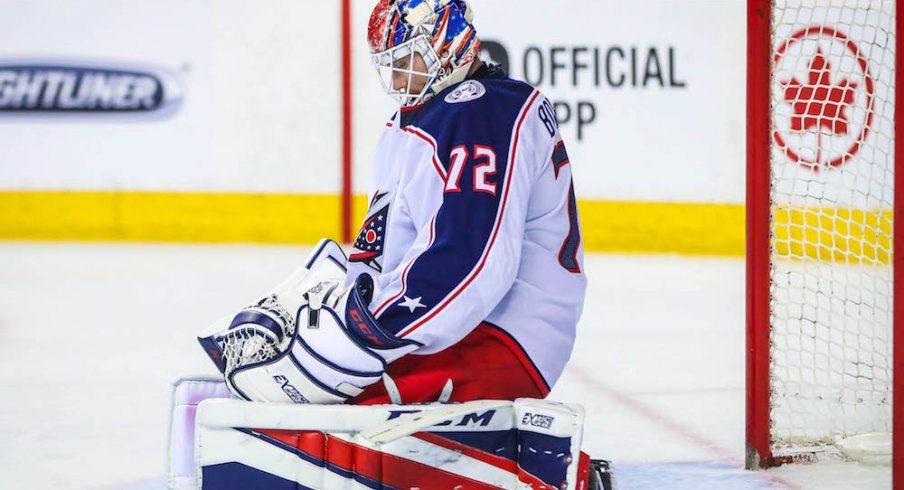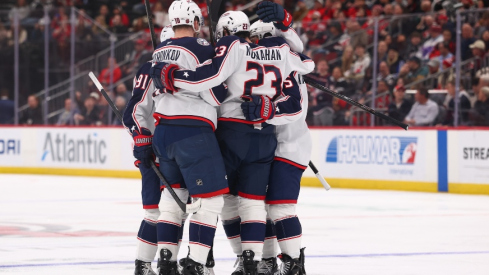Make no mistake: Sergei Bobrovsky is one of the best goaltenders in the world.
And because of that, he and his agent (Paul Theofanous) will demand he be paid accordingly. Bobrovsky's contract with the Blue Jackets – a four-year pact that pays him $7.425 million annually – expires after the coming season, and both parties are now permitted to discuss a long-term extension.
Except, well, they're not.
There have been whispers and murmurs about Bobrovsky's future with the Blue Jackets for the better part of a year, particularly after a second Vezina Trophy and the likelihood that he's cruising toward a contract in the $9-10 million range annually. Based on the rockiness of the last two negotiations between the two parties, there are many who believe a third go-round is becoming increasingly unlikely.
Add NHL Network's Kevin Weekes to the list, who tweeted this last week:
*Breaking News* Sens permission for Karlsson to have direct talks on an Extension with other teams Situation to watch : Not difficult to conclude that with no negotiations with @BlueJacketsNHL Bobrovsky wont be with CBJ beyond his contact, if not sooner as per Russian Rumblings
— Kevin Weekes (@KevinWeekes) July 3, 2018
The "if not sooner" part is interesting and probably not all that plausible, because it's mid-July and the Blue Jackets aren't going into the season without a No. 1 goaltender. Beyond that, though, it's a toss-up.
Do the Blue Jackets want to keep Bobrovsky in the fold, and sign him to a long-term deal? I believe they do. But I also believe they're not inclined to pay him $10 million per season, an annual salary that would usurp some of the world's best. On top of that, Bobrovsky's current salary is higher than:
- Pekka Rinne
- Carey Price
- Braden Holtby
- Marc-Andre Fleury
- Tuukka Rask
- Jonathan Quick
Is he better than most of those guys? It's a six-player list and Bobrovsky probably fits into the top three or four. But the fact of the matter is that, despite how great Bobrovsky's been just to get the Blue Jackets into contention three of the last four years, there are other goaltenders listed above who have played deeper into the spring and played their best hockey with everything on the line.
That's only part of the equation here, but it's a big one.
So let's say, hypothetically, that things don't work out and the Blue Jackets have to trade Bobrovsky and move on. Could they get a goaltender back in a deal? Of course, but not likely someone who can shoulder the load of a No. 1 right away; a top goalie prospect would be nice, or a stop-gap that can compete with Joonas Korpisalo for the balance of the year.
In the summer of 2019, though, the Blue Jackets aren't completely screwed.
They'd be in the market for a goaltender. A legitimate No. 1 who can play 55-60 games and has a proven track record in the NHL. Good news? While not all of these goaltenders will hit the market, more than a few of them will and the Blue Jackets would then have options.
The "A" Group
Pekka Rinne: Of the scheduled-to-be-free-agent netminders, Rinne is the most interesting case. He's been a rock for the Predators for a long time, but Nashville has Juuse Saros waiting in the wings and champing at the bit for the No. 1 job. Rinne isn't getting younger and will be 36 years old when his current deal expires.
Marc-Andre Fleury: One of the most consistent top-end goalies in the game is headed for free agency in 2019 if he doesn't re-up with the Vegas Golden Knights, who have young goalies of their own ready to go (Malcolm Subban, Maxime Lagace and Oscar Dansk are all under contract). Fleury will be 34 if/when he hits the open market but his resurgence in Vegas will mean plenty of interest from NHL teams.
Cam Talbot: No, it hasn't been smooth sailing for Talbot in Edmonton – but there's some validity to his performance being the product of a tough situation. Nothing's gone right for the Oilers and they can't seem to get on track, despite having plenty of talent and now a goaltender who's on the verge of free agency.
Michal Neuvirth: The jury's still out if Neuvirth is a true No. 1, but he's definitely shown flashes over the last few seasons – including a .924 save percentage in 32 starts with the Flyers in 2015-16. He's got game, but injuries limited Neuvirth to only 22 starts last season.
Dark Horse
Keith Kinkaid: In the absence of Cory Schneider, Kinkaid stepped up and helped the Devils get into the playoffs in 2017-18. He made 38 starts for New Jersey, going 26-10-3 with a .913 save percentage. If the Devils intend to keep Schneider as their starting goalie (he's under contract through 2021-22 at $6 million annually), then Kinkaid will look elsewhere for a chance to compete for a starting job. He wouldn't cost nearly as much as the above players, either.
No Thanks
Semyon Varlamov: Off-ice concerns (a domestic violence civil suit brought forth by his then-girlfriend, which was dismissed due to lack of evidence) are attached to Varlamov, which should cause the Blue Jackets to look elsewhere. The 30-year-old has been a No. 1 goalie for most of his career, but injury trouble has limited him in recent years.
Mike Smith: Will likely command too much money for what he'll provide the Blue Jackets at age 37, which is a stop-gap solution until someone else is ready.
The Other Option
Internal. Elvis Merzlikins is contractually obligated to spend one more season with Lugano overseas, at which point he will be free to sign with the Blue Jackets and continue his pro career in North America. He's considered by many goalie experts to be a legitimate No. 1 prospect and perhaps the Blue Jackets' goaltender of the future. If they want to spend their money elsewhere – which wouldn't be a bad idea, as many of the free agent options are older – Merzlikins has the potential to be a starter (but asking that of him in his rookie NHL year might be a lot).

